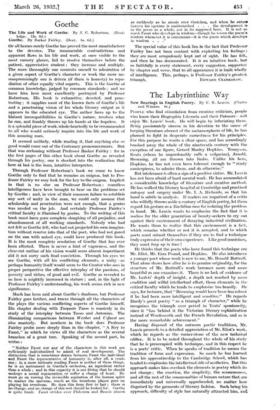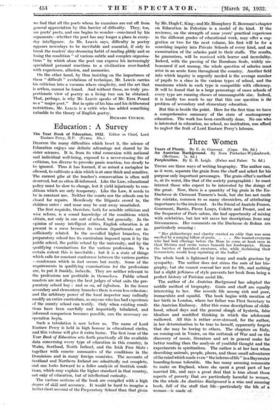The Labyrintnine Way
PEortz who find stimulation from creative criticism, people who know their Biographia Litentria and their Patmore--will enjoy Mr. Leavis' book. lie will begin by infuriating them. Being passionately sincere in his devotion to the cause of keeping literature abreast of the metamorphosis of life, he has planned to fight in desperate earnestness for his principles. For this purpose he wants a clear space, and has accordingly brushed away the whole of the nineteenth century with the exception of one figure, Gerard Manley Hopkins. Tennyson, Keats (whom lie unpardonably calls a vulgarian), Arnold, Bumming, all are thrown into limbo. Unlike his hero, Hopkins, he has not even been tolerant enough to " study masterpieces, to admire them, and do otherwise."
But intolerance is often a sign of a positive virtue. Mr. Leavis has not been afraid of hard mental work. He has accumulated a considerable knowledge of literature and creative method. He has walked the literary hospital at Cambridge and practised autopsy and surgery under Mr. I. A. Richards, so that his hand is subtle in analysis. If readers are impatient of a critic, who wilfully throws aside a century of English poetry, let them regard his gesture as a Euclidian rase for isolating the problem in hand. Mr. Leavis wants to emphasize the fact that it is useless for the older generation of beauty-seekers to cry out against their environment of decaying industrial civilization. lie wants them to realize that this environment is a fact, which remains whether or not it is accepted, and to which poets must submit themselves if they arc to find a technique truly expressive of their own experience. Like good musicians, they must keep up to time !
He thinks that the poets who have found this technique arc Mr. Eliot, Mr. Ezra Pound, and Hopkins. Ile also introduces a younger poet whose work is new to me, Mr. Ronald Dottrel]. That alone shows how alive he is to genuine originality, for the structure of Mr. Bottrall's work becomes more and more beautiful as one examines it. There is no lack of evidence of Mr. ',crisis' depth of insight, a depth not reached by mere erudition and wilful intellectual effort, those elements in the critical faculty which he tends to emphasize too heavily. He says, for instance, that "Browning would have been less robust if he had been more intelligent and sensitive." Ile regards Hardy's great poetry " as a triumph of character," while he recognizes the triumph over period in Yeats' spontaneity, since it "has behind it the Victorian literary sophistication instead of Wordsworth and the French Revolution, and so is the more remarkable achievement."
Having disposed of the outworn poetic traditions, Mr. Leavis proceeds to a detailed appreciation of Mr. Eliot's work, which he regards as the corner-stone of the new technical edifice. It is to lie noted throughout the whole of his study that he is preoccupied with technique, and in this respect he is a poets' critic. When he speaks of tradition he means the tradition of form and expression. So much be has learned from his apprenticeship to the Cambridge School, which has tended to emphasize the intellectual side of aesthetics. But this approach makes hint overlook the elements in poetry which do not change ; the emotion, the simplicity, the sensuousness, and all the rest of the commonalties of human nature that are immediately and universally apprehended, no matter how disguised by the garments of literary fashion. Such being his approach, difficulty of style has naturally attracted him, and we find that all the poets whom he examines are cut off from general appreciation by this barrier of difficulty. They, too, are poets' poets, and one begins to wonder—convinced by his arguments—whether the poet has any longer a place in every- day intelligence. As Mr. Leavis says, difficulty in poetry appears nowadays to be inevitable and essential, if only to break the readers' day-dreaming habit of reading glibly and so lasing the condition " of various subtle and complex organisa- tions " by which alone the poet can express his increasingly specialized personal reactions to .a civilization over-loaded with experience, allusion, and memories.
On the other hand, by thus insisting on the importance of these " difficult " evolutions of technique, Mr. Leavis carries his criticism into a vacuum where simplicity, and the art that is artless, cannot be found. And without these, no truly pro- portionate view of poetry as a living tree can be obtained. That, perhaps, is why Mr. Leavis speaks of Mr. Ezra Pound as a " major poet." But in spite of his bias and his deliberated restrictions, Mr. Leavis is a critic who has added something valuable to the theory of English poetry.
RICHARD Cituacn.



































 Previous page
Previous page